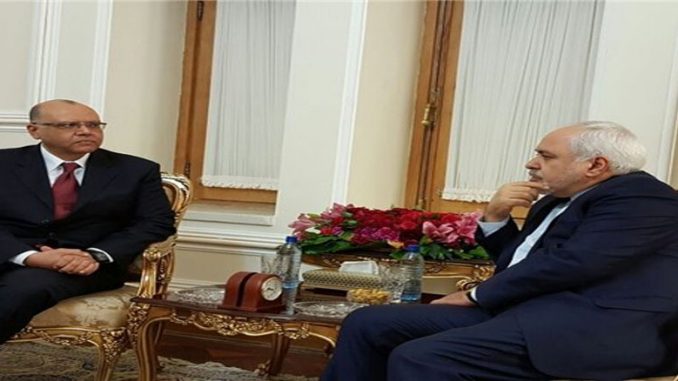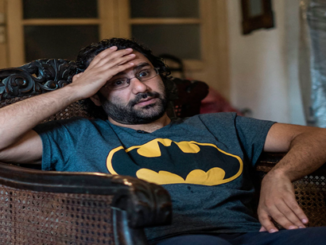
While Bashar Al-Assad’s regime, backed by the Iranian ground forces and Shi’ite militia fighters, was almost exterminating Aleppo, the Egyptian regime under Abdel-Fattah Al-Sisi was boosting its bilateral relations with Iran. An Egyptian diplomat has reportedly met with the Iranian FM in Tehran in a latest sign of rapprochement between the two countries.
Tehran Times, a state-backed newspaper, revealed that an Egyptian official has met with Iranian Foreign Minister Mohammad Javad Zarif in Tehran.
The Iranian newspaper said that Yasser Othman, the head of Egypt’s Interests Section office in Tehran met with Zarif on Monday to discuss “regional issues”.
Recently, speculations over Egyptian-Iranian rapprochement have been tracked despite the statement of Egyptian Foreign Minister Sameh Shoukry a few days ago in which he denied that there were ongoing efforts to overcome strained diplomatic ties with Saudi rival Iran.
Shoukry said, “Egypt maintains a severance of diplomatic relations with Iran in the past 25 years and has taken no position to change that situation.”
He added, “Egypt has always taken the opportunity of such discussions to re-emphasize the positions of the Arab nation, the interest of the Arab nation, vis-a-vis what might be expansionary policies of Iran.”
Syria is bringing Egypt and Iran closer
It seems that Egypt’s al-Sisi explicit support to al-Assad regime brings Egypt close to Iran as well as the Russian axis.
In October, Egypt voted in favor of a Russian-backed draft resolution in the UN Security Council on Syria, which was opposed by Saudi Arabia.
As a result, Egypt’s stance has angered Egypt’s major Gulf backer which condemned Egypt’s vote and described it with the” painful” stance.
After the voting, the Saudi ambassador to the UN, Abduallah al-Mouallimi, said, “It was painful that the Senegalese and Malaysian stance was closer to the Arab’s consensus than the Egyptian delegation.”
He also said that he feels pity for these countries that voted for the Russian resolution, stressing that his country will continue backing the Syrian people by all means.
Two days following the voting, Saudi state-owned oil company Aramco announced halting oil product supply to Egypt.
Despite the tensions between Cairo and Riyadh, Iranian officials praised Egypt for its policy towards Syria.
Hossein Amir Abdollahian, a senior advisor to the parliament speaker, praised Egypt for its “constructive and useful” positions on the Syrian crisis and campaign against terrorism last October, as reported by Tehran Times.
In a meeting with Yasser Othman, Amir Abdollahian said “Iran and Egypt are two big and influential countries which can play a constructive role through mutual cooperation in the region to help soothe tensions.”
Othman also said that Iran plays an important role in the region and called for increased consultations between the two countries to ameliorate the volatile situation in the region, said Tehran Times.
Moreover, at a previous time leaked emails revealed by the Guardian showed that Iran had requested the lobbying for Egyptian officials to attend the talks on the Syrian crisis in Lausanne conference.
The Guardian said that it has seen emails indicating that the Iranian foreign minister, Mohammad Javad Zarif, asked Kerry for Cairo’s team to attend the Lausanne talks. When the US secretary of state proposed six-nation talks to “see if a new reasonableness can manifest itself” in Syria, Zarif replied: “Why not Egypt too?”
Iran agreed to attend the talks only once it had secured places for the foreign ministers of Egypt and Iraq at the discussions, according to the Guardian.
The Guardian also cited a tweet posted by Sadegh Ghorbani, a journalist at Fars – the “semi-official” news agency of the government of Iran, saying that it was “interesting how Sisi’s Egypt is gradually shifting from US-Saudi axis towards Russia-Iran. Tehran-Cairo relations revival maybe question of when not if.”
Furthermore, Reuters has reported that Egypt’s Petroleum Minister Tarek El Molla travelled to Iran last month trying to strike new oil deals. Molla is set to meet several senior Iranian officials to discuss the possibility of securing oil supplies from Tehran, according to the source, who accompanied Molla to the airport, said Reuters.
Egypt seeks to reach oil deals after Saudi Arabia suspended its oil supply last month that was expected to reach 700,000 tonnes monthly for 5 years be paid off over 15 years, according to an agreement with $23 billion between Saudi Aramco and Egyptian General Petroleum Corporation.
However, Egyptian and Iranian diplomats denied the news.
Al-Sisi’s rapprochement with the Russian-Iranian axis
In fact, Egypt’s al-Sisi stance in favor of the Russian Iranian axis has appeared recently in his policies towards the Syrian crisis.
There were signs of military support to al-Assad’s regime as well as the diplomatic support that appeared during the UN voting.
A few days ago, Bashar al-Assad of Syria stressed that the Egyptian-Syrian relations are improving, adding that the relations have been limited only to military cooperation.
In an interview with al-Watan, a Syrian newspaper, al-Assad welcomed Abdel Fattah al-Sisi’s statements on supporting the national Syrian army saying, “We hope that al-Sisi’s statements would be reflected on improving the relations between both countries.”
It is noteworthy that al-Sisi revealed last November that Egypt supports the Syrian national army in the fight against whom he described as the extreme elements. During his interview with the Portuguese TV network RTP, Al-Sisi expressed support for Syrian Bashar al-Assad’s army.
Al-Sisi said that the Syrian government’s army forces are best positioned to combat terrorism and restore stability in the war-torn nation.
When al-Sisi was asked if he’d send Egyptian peacekeepers to Syria under a peace deal, he said that “it is better that the national army take responsibility” and that his priority is to “support the national army” of Syria.
However, days after Al-Sisi declared his support to Bashar Al-Assad’s army forces, Al-Safir, a Lebanese newspaper close to the Shiite militant group Hezbollah, revealed that an Egyptian unit, including 18 Egyptian pilots started to work at Hamah military airbase in Syria on November 22.
18 pilots were part of a special helicopter squadron operating at Hamah airbase and have been at the base since 12 November, according to the same source.
It is not known if the pilots have already participated in airstrikes or not, but their presence at Hamah airbase shows that there is an Egyptian-Syrian decision to speed up merging the Egyptian pilots.
The first group of four high-ranking Egyptian officers from the Egyptian General Staff entered Syria and were deployed in the Syrian army’s general staff base in Damascus, adding that two Egyptian Major Generals started work in the Syrian army’s operations room a month ago, and their responsibility is leading reconnaissance operations, the latest of which was in Quneitra in Southern Syria, the Golan Heights and Daraa.
Arab sources were quoted saying that Cairo is also studying dispatching its ‘Thunder Forces’ to Syria to help the army more extensively in operations.
It also quoted senior Syrian security sources as saying that the Egyptians have promised Damascus to send their forces to Syria and will start massive participation in battles there on January 23, adding that Cairo’s military presence will go beyond its role in Hama airbase.
It seems that the Egyptian participation with AL-Assad’s army is the fruit of the Egyptian-Syrian communications and efforts during the past weeks after a series of undeclared security meetings between Cairo and Damascus that started weeks ago, according al-Safir.
Last October, a top Syrian intelligence official discussed security coordination with his Egyptian counterpart amid warming ties between the two countries.
Syria’s state news agency SANA reported then that Syrian National Security Bureau chief Ali Mamlouk “made an official visit to Cairo,” where he met with General Khaled Fawzy, the head of Egypt’s General Intelligence Service, as well as other “senior security officials.”
SANA said “The two sides agreed to coordinate political stances,” adding that they also decided to “strengthen coordination in the fight against terrorism.”
In August 2015 Mamlouk, who has served as a diplomatic troubleshooter for the Bashar al-Assad regime, previously traveled to Egypt in August 2015.
Al-Mamlouk was appointed chief of the Syrian National Security Bureau in 2012. He currently supervises all Syrian security apparatuses. Al-Mamlouk’s name is one of several Syrian names listed by imposed E.U. sanctions.
In the same context, Al-Masdar News (AMN), a news site concerned with the Syrian issue, reported that a group of officers from the Egyptian Army traveled to the port-city of Tartous, Syria, to train with Russia’s military advisors near the Islamic State’s front-lines.
Al-Masdar News said it quoted some local activists saying that the Egyptian officers were accompanied by Russian military personnel upon their arrival to Tartous.



